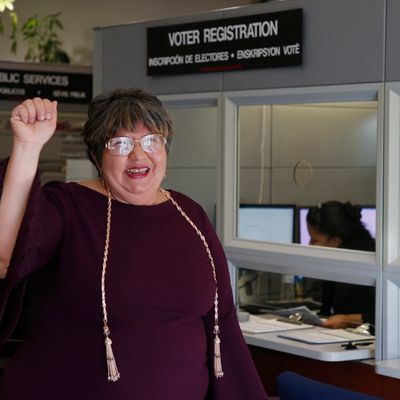
In 2018, Florida passed perhaps the most significant ballot measure of the midterm cycle, when 65 percent of voters approved an amendment that restored “the voting rights of Floridians with felony convictions after they complete all terms of their sentence including parole or probation.” Despite the strong support, Florida’s Republican-controlled legislature proposed a law in 2019 that would negate this measure and remove much of this constituency from the rolls by requiring former prisoners to pay court costs, fines, and fees before their voting rights could be restored (again).
As New York’s Eric Levitz explains, there’s a common term for such an unconstitutional effort:
Republicans argue that ex-felons who have not repaid their literal debts have not completed “all terms of their sentence” — a deeply counterintuitive reading of the ballot measure’s wording. What’s more, the bill makes no exception for ex-felons who are gradually paying off their debts through court-approved payment plans. If an ex-felon has enough wealth or income to pay off their debts in one lump-sum payment, then she will have the right to vote in Florida. If she is poor — and thus, can only pay off her fines in monthly installments — she will not.
The term for a rule that restricts the franchise on the basis of a person’s financial means is “poll tax.”
But on Sunday, a federal judge struck down the law that would disenfranchise the recently reenfranchised Floridians, determining that the payment plan system legally qualified as a poll tax. In his decision, U.S. district court judge Robert Hinkle wrote that the state “cannot condition voting on payment of amounts a person is unable to pay or on payment of taxes, even those labeled fees or costs.” Hinkle also noted there was an obvious “racial impact” to the GOP-led law; one in five felons in the state is black. “Why is it that all the Republicans voted yes and all the Democrats voted no?” Hinkle asked. “That is not a coincidence. It would be stunning if somebody told me that they did not realize that African-Americans tend to vote Democratic more than Republican.”
The full reinstatement of voting rights for ex-felons will certainly have an impact on the crucial swing state: The initial ballot measure restored the vote for around 1.5 million residents, 430,000 of which were affected by the Republican poll tax. But as Vox noted in 2018, the influx of potential new voters won’t end Florida’s status as a battleground state:
One thing that limits the electoral impact of restoring ex-felons’ voting rights is that they turn out at particularly low rates. To demonstrate this, we first look to the population of ex-felons who were restored the right to vote under Crist and calculate what share voted in 2016. We find that just 16 percent of black and 12 percent of nonblack ex-felons voted. (We defined nonblack as white, Hispanic, Asian, and other due to data limitations.)
The potential electoral impact of Florida’s ballot initiative is further limited by the fact that the ex-felons who do vote are not politically uniform. While black voters within this population overwhelmingly register with the Democratic Party (87 percent), nonblack voters within this population were more likely to register as Republicans (40 percent) than as a Democrats (34 percent). The fact that 26 percent of the remaining nonblack voters affiliate with neither party suggests that their votes may not reliably be cast for either party …
Although people do not always vote consistent with their party of registration, we can approximate the electoral impact by assuming that they would. Specifically, we multiply the estimated disenfranchised population first by the turnout rate and then by the party registration rate for both black and nonblack individuals. Had all ex-felons been eligible to vote in Florida in 2016, we estimate that this would have generated about 102,000 additional votes for Democrats and about 54,000 additional votes for Republicans, with about an additional 40,000 votes that could be cast on behalf of either party.
A potential net gain for Democrats of up to 48,000 votes would be a significant boost, as three of the last five presidential contests in the state have been decided by 113,000 votes or less. And if Trump’s recent polling slump among seniors is reflected in Florida — where 20 percent of voters in 2016 were over 65 — there’s a possibility that it could become a pivotal Obama-Trump-Biden state.






























